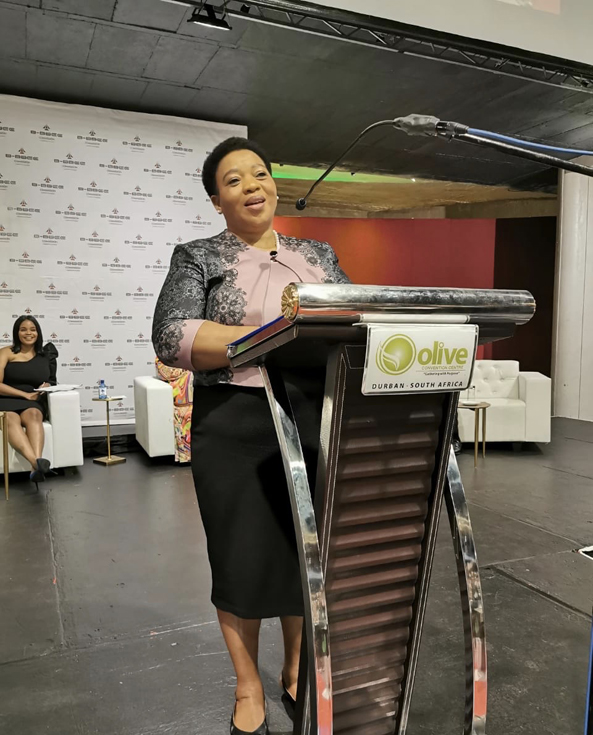B-BBEE Necessary for Creating Capacity Within the Broader Economic Landscape – MEC Dube-NcubeThe MEC for Economic Development, Tourism and Environmental Affairs in KwaZulu-Natal, Ms Nomusa Dube–Ncube says Broad-Based Black Economic Empowerment (B-BBEE) legislationplaces a meaningful participation of the majority of South African citizens as being necessary for the creation of capacity within the broader economic landscape. Dube–Ncube was speaking at the B-BBEE Commission’s annual conference hosted in Durban. According to Dube-Ncube, the legislation seeks to do more than just empower black people. She said it seeks to drive economic transformation and for black people to drive economic growth. “The economic involvement of black people as owners, industrialists are not only to empower them, but to build a cadre of entrepreneurs that through their businesses will grow our economy. Therefore, B-BBBEE is in the interest of every citizen, black and white, without B-BBEE, our economy will not grow,” said Dube–Ncube. Dube–Ncube added that government must increase the extent to which communities, workers, co-operatives and other collective enterprises own and manage existing and new enterprises and increasing their access to economic activities, infrastructure and skills training. “This will include the mainstreaming of gender, youth and people with disabilities, children, senior citizens and military veterans into the plan, therefore data will have to be disaggregated by race, age and gender. Over the next five years we would like to see substantial increase in the number of black people who have ownership and control of existing and new enterprises targeting priority sectors such as the oceans economy, agriculture, ICT and aerotropolis-related businesses,” she said. Welcoming stakeholders at the same conference, the B-BBEE Commissioner, Ms Zodwa Ntuli said implementation of the B-BBEE legislation is the responsibility of both government and private sector, and it is critical for implementers to understand what is required to facilitate enterprise and supplier development in growing sustainable black owned businesses. She said the private sector, non-governmental organisation, non-profit designation, businesses and black entrepreneurs must all work together to see it succeed. She also highlighted some of the trends that the B-BBEE Commission has identified, such as the mushrooming of third party funds that do not result in actual benefits of enterprise and supplier development reaching black owned businesses, as well as legal action taken against government institutions for failure to apply to the Minister of Trade and Industry to set higher B-BBEE targets to provide opportunities to black owned businesses. “Failure to properly implement enterprise and supplier development negatively impact on the potential this element has in unlocking growth for black owned and managed businesses. It is important to have real and strategic partnerships involving black entrepreneurs and corporates, which can be measured to achieve the National Development Plan goals of sustainable SMMEs sector that should create 90% of the jobs by 2030. Hence the need for the session today, to provide a platform to unpack the enterprise and supplier development element and also demystify any misconceptions around B-BBEE,” said Ntuli.  For more information, visit www.bbbeecommission.co.za For media enquiries contact: Sidwell Medupe – Departmental Spokesperson Tel: (012) 394 1650 Mobile: 079 492 1774 E-mail: MSMedupe@thedti.gov.za Issued by: The Department of Trade and Industry Follow us on Twitter: @the_dti |
MENUMENU
- Know the dtic
- Media Room
- Financial Assistance
-
-
- INCENTIVES
- 12I Tax Allowance Incentive
- Agro Processing Support Scheme (APSS)
- Aquaculture Development and Enhancement Programme (ADEP)
- Automotive Investment Scheme (AIS)
- Black Industrialists Scheme (BIS)
- Capital Projects Feasibility Programme (CPFP)
- Critical Infrastructure Programme (CIP)
- Clothing, Textiles, Footwear and Leather Growth Programme (CTFLGP)
- Export Marketing and Investment Assistance (EMIA)
- Film Incentive
- INCENTIVES
-
- INCENTIVES
- Global Business Service (GBS)
- Innovation and Technology Funding instruments
- Manufacturing Competitiveness Enhancement Programme (MCEP)
- Production Incentive (PI)
- Manufacturing Support Programme (MSP)
- Sector Specific Assistance Scheme (SSAS)
- Strategic Partnership Programme (SPP)
- Support Programme for Industrial Innovation (SPII)
- Technology and Human Resource for Industry Programme (THRIP)
- Workplace Challenge Programme (WPC)
- INCENTIVES
-
-
- Sectors and Service
- Sectors
- B-BBEE
- Special Economic Zones
- Industrial Development
- Trade and Export
- Legislation and Business Regulation
- Bills and Acts
- Statutory Committees
- National Liquor Authority
- Proposed prohibition of the use of certain EU names
- Institutional Support for Business
- South African Council for Space Affairs
- InvestSA
- Non-Proliferation
- The South African Council For Space Affairs
- Procurement and Tenders
- Research and Statistics

